七年级上一般疑问句与特殊疑问句练习
七年级一般疑问句和特殊疑问句
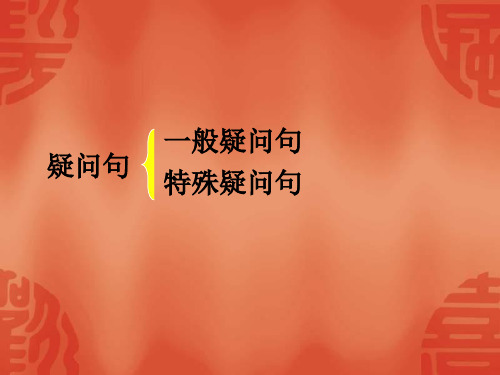
2.将下列句子变成单数。
1.They are pencils. It
is a pencil.
2.These are erasers. This is an eraser.
3.They are boys. He is a boy.
4. They are girls . She is a girl.
5.Those are books. That is a book.
Your mouth is wide.
五.单复数转换
1.将下列句子变成复数. It is a box . They are boxes .
This is a ruler. These are rulers. That is an eraser. Those are erasers. He is a student. They are students. This is a bus. These are buses . That is a pen. Those are pens .
肯:Yes, she does.否:No, she doesn’t.
3.问句和答语中的主语保持一致。(必须用主格)
1) Is Jane from the U.S.A?
肯:Yes, she is. 否:No, she isn’t.
2) Does Kangkang come from China?
肯:Yes, he does. 否:No, he doesn’t.
3) Do Jane and Maria like China?
肯:Yes, they do. 否:No, they don’t.
4) Is this a ruler?
肯:Yes, it is . 否:No,it isn’t.
初一英语上学期语法一般疑问句及特殊疑问句

例:Do Thomas come here everday? Yes, he does./ No ,he doesn’t.
Is Lin Lin in Class 3? Yes, she is. / No, she isn′t.或(No, she′s not).
特殊疑问句
点击此处添加正文,文字是您思想的提炼,为了演示发布的良好效果,请言简意赅的阐述您的观点。点击此处添加正文,文字是您思想的提炼,为了演示发布的良好效果,请言简意赅的阐述您的观点。
6
→Is your father playing soccer?
7
如果陈述句中有some, 则变问句时往往要变成any 。
例: There is some water on the playground.
→Is there any water on the playground?
如果句中含有实义动词have且表示“有”时, 使用do
陈述句变一般疑问句应注意的事项
1
陈述句变成一般疑问句除了遵循上述规则以外,还应注意下列几点:
一般疑问句和特殊疑问句及练习题
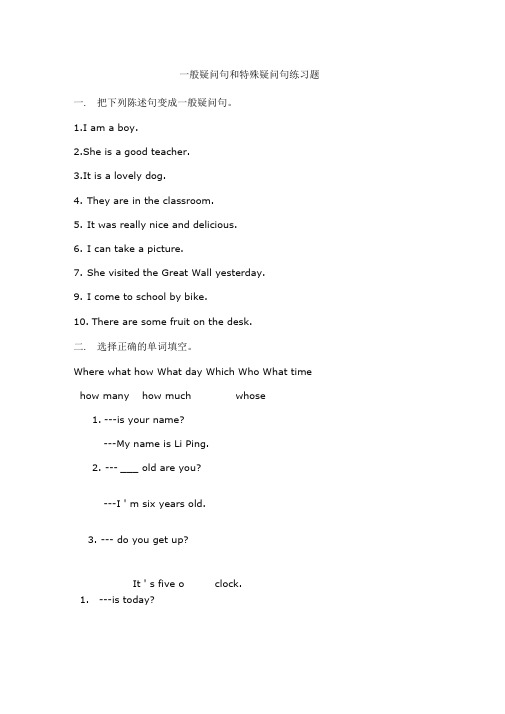
一般疑问句和特殊疑问句练习题一. 把下列陈述句变成一般疑问句。
1.I am a boy.2.She is a good teacher.3.It is a lovely dog.4.They are in the classroom.5.It was really nice and delicious.6.I can take a picture.7.She visited the Great Wall yesterday.9.I come to school by bike.10.There are some fruit on the desk.二. 选择正确的单词填空。
Where what how What day Which Who What time how many how much whose1.---is your name?---My name is Li Ping.2.--- ___ old are you?---I ' m six years old.3.--- do you get up?It ' s five o clock.1.---is today?---Today is Monday. 2.--one do you like best?--I like the black one. 3.—is she?---She is my teacher.4.---are you going?--- I ' m going to the store.5.--- are you!---I ' m fine.6.--- is it?--- It ' s five o ' clock.10. ---do you get here?---By bus.11.---are they?---They are 80 yuan.12.---books do you have?---I have two books13.---room is this?--- It ' s room.三. 对划线部分提问.1.I am going to Shanghai.2.My father will take me to Beijing.3.I went to here by bus.4.We send some beautiful flowers to our teacher.I 一般疑问句和特殊疑问句一.一般疑问句能用Yes或No回答的疑问句叫一般疑问句。
初一i英语一般疑问句和特殊疑问句讲解及练习完整版
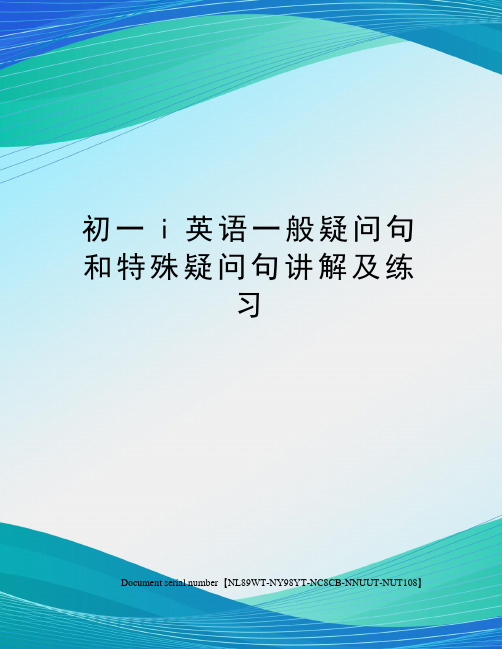
初一i英语一般疑问句和特殊疑问句讲解及练习Document serial number【NL89WT-NY98YT-NC8CB-NNUUT-NUT108】初一英语一般疑问句和特殊疑问句一般疑问句1.定义:用be或助动词或情态动词置于句首,并以“Yes,…”,或“No,…”或相当于yes/no回答的问句称为一般疑问句.2.含系动词be的一般疑问句的构成:具体地说,am只能跟在第一人称的单数I 后面,are搭配you,不管是单数还是复数,is跟在第三人称单数he,she后面Eg:I'minClass2,Grade1.→AreyouinClass2,Grade1?(如遇第一人称,最好将其置换成第二人称)It'samapofChina.→IsitamapofChina?这是一幅中国地图吗?AmIwrongagain?(我又错了)3.含情态动词的一般疑问句的构成一般疑问句面前人人平等:情态动词与am/is/are一样,也可直接将它们提至主语前,所以问题迎刃而解了。
如:Icanspellit.→Canyouspellit?你会拼写它吗?Willyoudothatforher?Canshedrive?4.含实义动词的一般疑问句的构成含实义动词的一般疑问句的构成稍微有点讲究,要在句首加do;如逢主语为第三人称单数,谓语动词为一般现在时单数第三人称形式"v-(e)s"时,用does,并要将谓语动词变回原形(如has→have,likes→like 等);有时陈述句中的some还要变作any等。
如:ShelivesinBeijing.→DoessheliveinBeijing?IlikeEnglish.→DoyoulikeEnglish?Therearesomebooksonmydesk.→Arethereanybooksonyourdesk?5.一般疑问句的应答用yes/no回答,并怎么问怎么答(句首为情态动词/am/is/are还是do/does),简略回答时要注意缩写(否定的n't)和采用相应的人称代词以避免重复:即"Yes,主语(代词)+情态动词或am/is/are或do/does."表示肯定;"No,主语(代词)+情态动词或am/is/are或者do/doesnot(n't)."表示否定。
一般疑问句与特殊疑问句练习
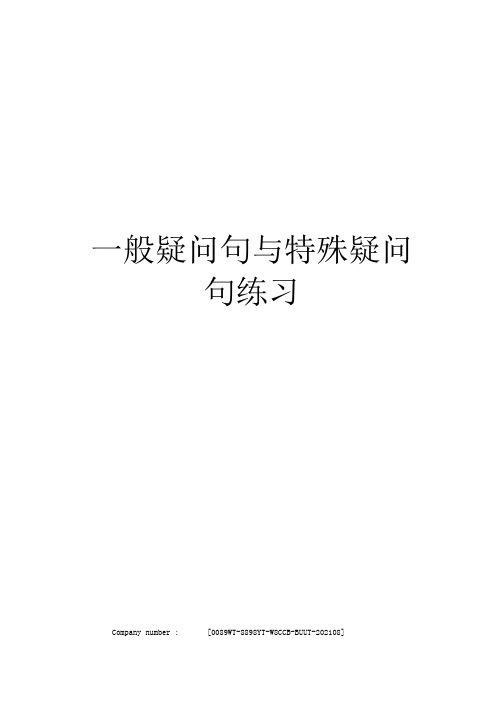
一般疑问句与特殊疑问句练习Company number : [0089WT-8898YT-W8CCB-BUUT-202108]巩固练习(一)She is quiz (改为一般疑问句)_He is very tall.(对划线部分提问)She^s very kind and preUy ・(对划线部外提问)Today is Saturcby.(对划线部分提问) ___ Is that a pen (作否定回答)__________ 10- Are the apples sour (作否定回答) _____17. Pork is my favourite food.(对划线部分提问). 1& There is a big closet.(改为否定句) 19. There are blue curtains.(改为一般疑问句)20. Is this your bedroom (改为复数形式) _____21. The shelf is near the desk ・(对划线部分提问)22. Are these your friends (作肯定回答) ___23. There are two curtains.(对划线部分提问) 24. It's a new desk ・(对划线部分提问) 25. Is it a walkman (作否定回答) 26- There is a small house in iny village.(改为复数形式)there a bke (作否定回答) _______________________are some buildings in our school.(改为一般疑问句). are some tall buildings in the city •(改为一般疑问句) there a river in your vi!lage (作肯定回答)is a bridge in my village.(改为复数形式) _______33, Are there any pandas in the inountains (作否定回答)34, There is a village.(改为一般疑问句)35. The flowers are 些1(对划线部分提问)36. He is our math teacher.(对划线部分提问)37. There is a student in the room/改为复数句子) 3& He's tall and thin.(改为一般疑问句) 39. Are2. 3. 4.5.6. Is Mr. Smith tall and strong (作肯定回答) Is this iny book (作否定回答) ______ She is young. She is pretty •(合并为一句)7. 9.they young(作肯定回答)40, is my father.(对划线部分提问)4L.They are under the tree•(对划线剖分提问)42・・The supermarket is near the school.(对划线部分提问)43..__________________________________________________ The computer is on the table.(对划线部分提问)______________________________________________44..The flowers are in the flower park(对划线部分提问)M feeling血1 .(对划线部分提问)_46.. My bag is型・(对划线部分提问)get up at six •(对划线部分提问)_ is a nurse •(对划线部分提问)are five yuan •(对划线部分提问)is my coat.(对划线部分提问)_______________________________一般疑问句与特殊疑问句巩固练习(二)将下列句子改为否定句,一般疑问句,并做肯定和否定回答。
七年级上_一般疑问句、特殊疑问句
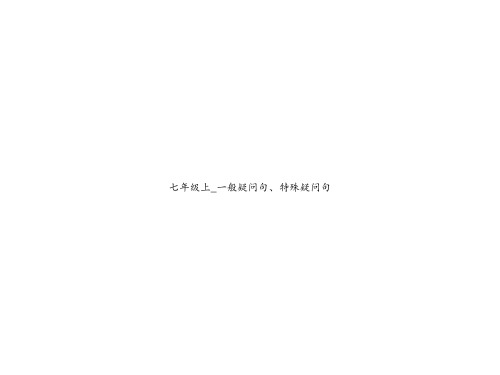
特殊疑问句(Special Questions)
• 特殊疑问句是以疑问词开头的问句, 其基本结构是“疑问词 + 一般疑 问句”,其答语不用yes或no, 而要 作具体回答。
eg: When do you have P.E.?
How…?
询问身体状况、方式方法等。 How is your mother?
How old…? 询问年龄。
How old is she?
When…? • 询问时间。什么时候。 When is your birthday? The basketball game is May 11th.
When is the basketball game?
如何把一般现在时态的陈述句变
为一般疑问句呢?
按词种类的不同将其分为两类:
一、含系动词be(am / is / are)或情 态动词(can 等)的一般现在时的句 子。
[秘诀]一调二改三问号
一调:即把be(am / is / are)或can等 词调到主语前;
二改:句中的主语若含有I(my / we) 等第一人称代词时,需将它们分别 改为you(your / you); 三问号:句末的句号改为问号。
二改:句首加助动词Does之后,谓语动词 必须改为原形,句中的主语为第一人称代 词时变化为第二人称;
三问号:句末的句号改为问号。
eg: She likes apples. Does she like apples? He has a sister. Does he have a sister?
将下列句子改为一般疑问句
What’s your favorite subject?
特殊疑问句+练习
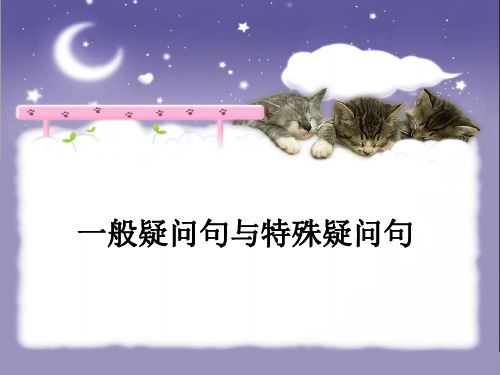
When
问时间,什么时候
1.When do you get up? 你什么时候起床?
2. When are you going? 你准备什么时候去?
Where
问地点
1.Where is my nose? 我的鼻子在哪? 2. Where are my shoes? 我的鞋子在哪里? 3. Where are you from? 你是哪里人? 4. Where are you going ?你打算去哪里?
How怎么样
询问身体等状况,询问乘交通工具等
1.How are you? 你好吗? 2.How is your mother? 你妈妈好吗? 3.How do you go to school? 你如何去上学的? 4.How can I get to the post office? 我怎样到达
邮局
2. Who are you going to with? 你打算和谁一起去?
3. Who is that beautiful girl? 那个漂亮的女孩是谁?
Whose,谁的
问东西是谁的
1.Whose bag is this? 这是谁的包?
2.Whose bike is yellow? 谁的自行车是黄色的? ※ 一般后面跟名词。
• 8._____ ball is this? • It’s Jim’s. • 9._____ does he jog? • He jogs in the park. • 10._____ are you late? • Because I didn’t catch the bus.
尝试练习三:
4.My grandparents live in Shanghai.
特殊疑问句和一般疑问句的用法
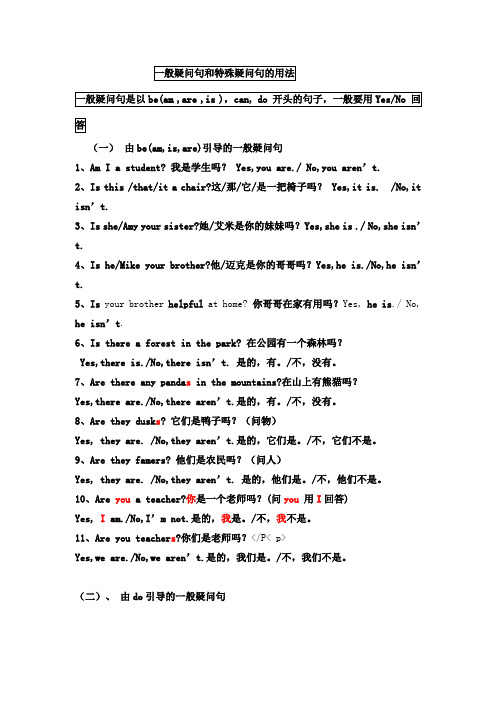
(一)由be(am,is,are)引导的一般疑问句1、Am I a student? 我是学生吗? Yes,you are./ No,you aren’t.2、Is this /that/it a chair?这/那/它/是一把椅子吗? Yes,it is. /No,it isn’t.3、Is she/Amy your sister?她/艾米是你的妹妹吗?Yes,she is ./ No,she isn’t.4、Is he/Mike your brother?他/迈克是你的哥哥吗?Yes,he is./No,he isn’t.5、Is your brother helpful at home? 你哥哥在家有用吗?Yes, he is./ No, he isn’t.6、Is there a forest in the park? 在公园有一个森林吗?Yes,there is./No,there isn’t. 是的,有。
/不,没有。
7、Are there any panda s in the mountains?在山上有熊猫吗?Yes,there are./No,there aren’t.是的,有。
/不,没有。
8、Are they dusk s? 它们是鸭子吗?(问物)Yes, they are. /No,they aren’t.是的,它们是。
/不,它们不是。
9、Are they famers? 他们是农民吗?(问人)Yes, they are. /No,they aren’t. 是的,他们是。
/不,他们不是。
10、Are you a teacher?你是一个老师吗?(问you 用I回答)Yes, I am./No,I’m not.是的,我是。
/不,我不是。
11、Are you teacher s?你们是老师吗?</P< p>Yes,we are./No,we aren’t.是的,我们是。
- 1、下载文档前请自行甄别文档内容的完整性,平台不提供额外的编辑、内容补充、找答案等附加服务。
- 2、"仅部分预览"的文档,不可在线预览部分如存在完整性等问题,可反馈申请退款(可完整预览的文档不适用该条件!)。
- 3、如文档侵犯您的权益,请联系客服反馈,我们会尽快为您处理(人工客服工作时间:9:00-18:30)。
一般疑问句与特殊疑问句一、be动词:am, is, are二、肯定句、否定句、一般疑问句和特殊疑问句定义1.肯定句:表示肯定的意思, 即不含有否定词“不”。
比如:我是一个学生。
I am a student.他去上学。
He goes to school.2.否定句:表示否定的意思。
比如:我不是一个男孩。
I am not a boy。
他不去上学 He does not go to school.3. 一般疑问句:回答为“是yes”或者“否no”的问句。
比如:你是一个学生吗? Are you a student?你喜欢英语吗? Do you like English?4. 特殊疑问句:回答不是“是yes”或者“否no”的问句,根据提问内容具体回答。
比如:现在几点了? What’s the time?哪一支笔是你的? Which is your pen?三、肯定句、否定句、一般疑问句和特殊疑问句的相互转换有am, is, are的句子肯定句变否定句:在am, is, are后面加上not,其余按顺序照抄。
肯定句变一般疑问句:把am, is, are提前放到句首并大写Am, Is, Are,其余照抄。
肯定句变特殊疑问句(就划线部分提问):分3步骤第一步:先变一般疑问句第二步:找合适的特殊疑问词代替划线部分第三步:特殊疑问词提前放到句首,并大写,其余按顺序照抄,省略划线部分。
注意:1.一定先变一般疑问句。
但是,如果问的是主语或主语的定语时,语序不变,为"特殊疑问词(+主语)+陈述句"。
如:Li ming 's not here today.Who's not here today? 今天谁没来?2.例如:1肯定句、否定句和一般疑问句的互换肯定句:This is a book.否定句:This is not a book.一般疑问句:Is this a book?肯定回答:Yes, it is.否定回答:No, it isn’t.2就划线部分提问(变特殊疑问句)This is a book.第一步:变一般疑问句 Is this a book?第二步:找合适的特殊疑问词 Is this what ?第三步:特殊疑问词提前放到句首,并大写,其余按顺序照抄,省略划线部分。
What is this?没有am, is, are的句子,肯定句变否定句:在主语后面加上do not或者does not,其余按顺序照抄动词用原形肯定句变一般疑问句:在句首加do或者does并大写,其余照抄。
注意:动词用原形肯定句变特殊疑问句(就划线部分提问):分3步骤第一步:先变一般疑问句第二步:找合适的特殊疑问词代替划线部分第三步:特殊疑问词提前放到句首,并大写,其余按顺序照抄,省略划线部分。
注意:1.一定先变一般疑问句。
但是,如果问的是主语或主语的定语时,语序不变,为"特殊疑问词(+主语)+陈述句"。
2.划线部分不能在特殊疑问句中出现。
非单三时用do, 单三时用does非单三肯定句:I like English.一般疑问句:Do you like English?否定句:I do not like English.三单肯定句:He likes English.一般疑问句:Does he like English?否定句:He does not like English.就划线部分提问:I like English.第一步:先变一般疑问句 Do you like English?第二步:找合适的特殊疑问词代替划线部分Do you like what?第三步:特殊疑问词提前放到句首,并大写,其余按顺序照抄,省略划线部分。
What do you like?巩固练习(一)1.She is quiet.(改为一般疑问句) ______________________________2.He is very tall.(对划线部分提问) ______________________________3.Is Mr. Smith tall and strong?(作肯定回答) ______________________________4.Is Mr. Carter tall?(作否定回答)______________________________5.She is young. She is pretty.(合并为一句) ______________________________6.Is she active?(作否定回答) ______________________________7.She’s very kind and pretty.(对划线部分提问) _____________________________8.That young lady is our principal.(对划线部分提问) ________________________9.Today is Saturday.(对划线部分提问) ______________________________10.We have Chinese and math on Wednesday.(对划线部分提问)___________________________11.Is she young?(作否定回答) ______________________________12.他又高又瘦。
(汉译英)______________________________13.I like vegetables.(改为否定句) ______________________________14.I would like the orange juice.(对划线部分提问)______________________________15.Are the apples sour?(作否定回答) ______________________________16.Sarah: What do you like? Mike: I like peaches.用第三人称转述这组对话。
(1)(汉语提示:迈克喜欢什么?)________________________(2)(汉语提示:迈克喜欢桃子。
)_________________________17.Pork is my favourite food.(对划线部分提问) ______________________________18.Can you play chess?(作肯定回答) ______________________________19.He can do the dishes.(改为一般疑问句) ______________________________20.I can wash the clothes.(对划线部分提问) ______________________________21.Can you set the table?(作否定回答) ______________________________22.There is a big closet.(改为否定句) ______________________________23.There are blue curtains.(改为一般疑问句) ______________________________24.Is this your bedroom?(改为复数形式) ______________________________25.I can see a mirror on the wall.(对划线部分提问)______________________________26.The shelf is near the desk.(对划线部分提问) ______________________________27.Is this your bedroom?(作肯定回答) ______________________________28.There are two curtains.(对划线部分提问) ______________________________29.It’s a new desk.( 对划线部分提问) ______________________________30.Is it a walkman?(作否定回答) ______________________________巩固练习(二)33.There is a small house in my village.(改为复数形式)______________________________34.Is there a lake?(作否定回答) ______________________________35.There are some buildings in our school.(改为一般疑问句)_____________________________36.I can run on the grass.(对划线部分提问) ______________________________37.I like this park.(改为否定句) ______________________________38.There are some tall buildings in the city.(改为一般疑问句)_____________________________39.Is there a river in your village?(作肯定回答) ______________________________40.There is a bridge in my village.(改为复数形式)______________________________41.不,没有。
(翻译成英文)______________________________42.I like my village.(改为否定句) ______________________________43.Are there any pandas in the mountains?(作否定回答)______________________________44.There is a village.(改为一般疑问句) ______________________________45.The flowers are red.(对划线部分提问) ______________________________46.Are there any buildings in the village?(作否定回答)______________________________47.There are some small houses in my village.(改为一般疑问句)__________________________48.Is the air clean?(作否定回答) ______________________________49.He is our math teacher.(对划线部分提问) ______________________________50.I can water the flowers.(改为一般疑问句) ______________________________51.I’d like some eggplants.( 改为一般疑问句) ______________________________52.we have English, science, computer and P.E. on Monday.(对划线部分提问)____________________________________________________________53.It’s Friday.(对划线部分提问) ______________________________54.There is a student in the room.(改为复数句子)______________________________55.What’s she like?(年轻又漂亮) ______________________________56.He’s tall and thin.(改为一般疑问句) ______________________________57.Are they young?(作肯定回答) ______________________________巩固练习(三)将下列句子改为一般疑问句,并做肯定和否定回答。
